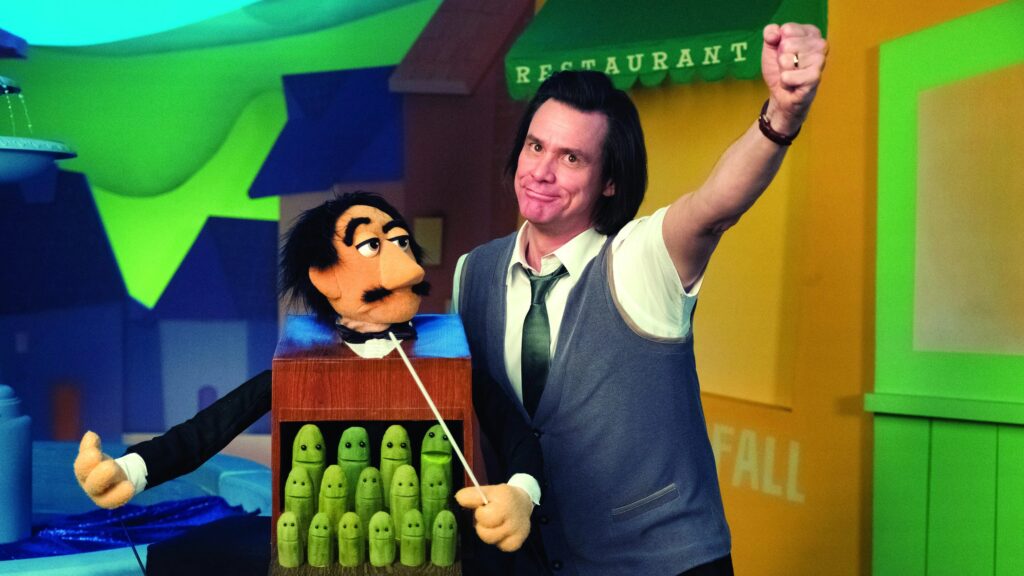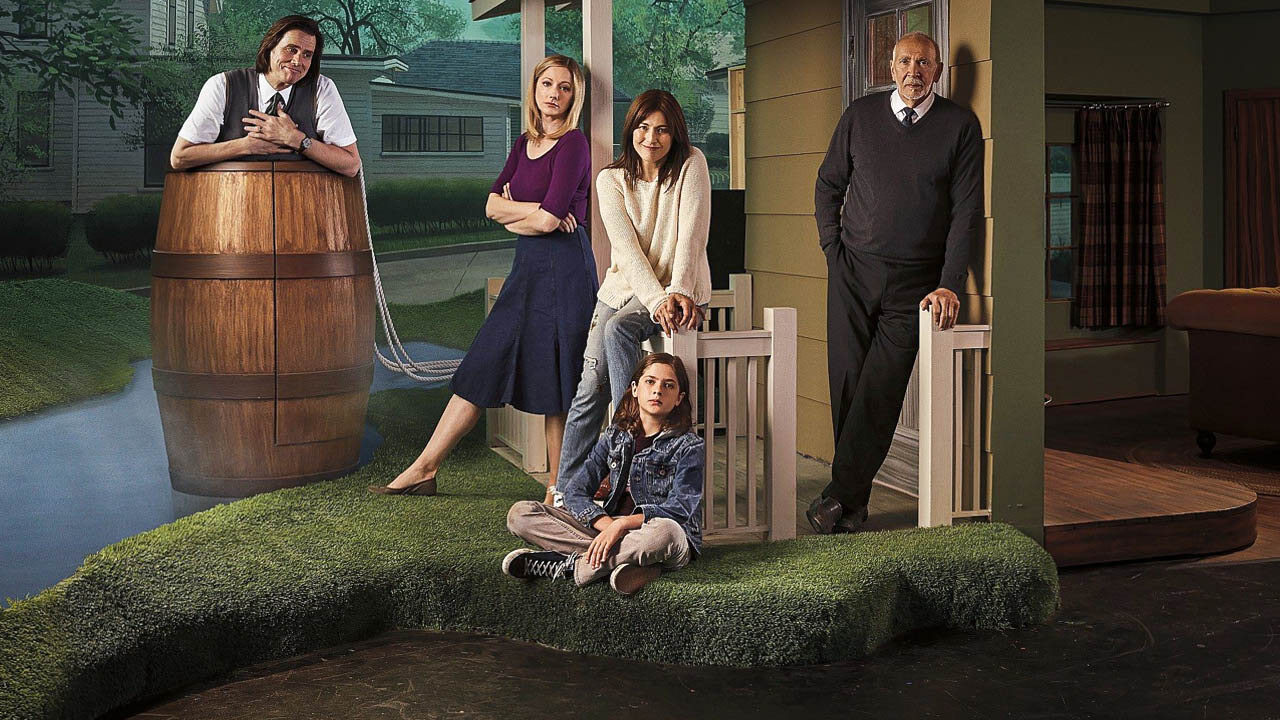“Hate doesn’t punish who you think it does.”
This isn’t a “hot take” if you have seen it: Showtime’s criminally short-lived Kidding (2018-2020) is the best scripted meditation on grief out there.
Detractors would most certainly agree the show is all the way out there, alright. But take it from me: it is, in the most beautiful way possible. Mega comedy movie star Jim Carrey goes small-screen with big swings, perfectly cast as Jeff Piccirillo / “Mr. Pickles,” the longtime host of a Mister Rogers-esque children’s television program. Thirty years into an iconically crafted persona of purely wholesome proportions, however, the walls are closing in on Jeff’s humble Columbus, Ohio-abode as Pickle Barrel Falls, the fictional setting of Mr. Pickles’ Puppet Time, feels its ground exponentially begin to rumble.
Deep in denial after the loss of his 11-year-old son, Phil, in a car accident a year earlier, Jeff tries desperately to ignore his subsequent marital woes by teaching America’s kids about death. He vows to before first confronting the enormity of his family’s new reality without cameras always rolling and pointed squarely on him, much to the chagrin of his wife, Jill (Judy Greer) and Phil’s identical twin brother, Will (Cole Allen).
From Dave Holstein, a writer on another ultra-consumable, half-hour dark Showtime comedy in Weeds (2005-2012), and Carrey’s Eternal Sunshine of the Spotless Mind (2004) director Michel Gondry, Kidding is self-assuredly wacky as all hell as it spotlights good public figures gone temporarily mad, and bubble celebrity hangers-on gone cataclysmically worse. As Jeff siphons Jill and Phil for empathy along his fantasy prison break pathos, the warden of his escapist dreamland, his merchandising-obsessed father and Puppet Time executive producer, Seb (Frank Langella), tries to turn his puppet master sister and sometimes equally delusional cellmate (Catherine Keener) against him— resulting in her turning on herself instead.
In what amounts to a spiritual fusion of Carrey classics like Liar, Liar (1997), The Truman Show (1998) and Bruce Almighty (2003), Jeff’s torment is three-pronged: he cannot tell a lie, is desperate to keep his family intact, and has grown more mythic than man due to the popularity of his TV show— thereby hindering his ability to properly deal with his own fallibility.
His mental abandon is to the point where, rather than taking a recommended sabbatical after having a Howard Beale-in-Network moment live on a Christmas telecast, Jeff turns to the commercialized toy-sized Mr. Pickles he once cried foul at as a radical means to speak to every child directly.
Continental Mr. Pickles and his ragtag assemblage of internationally syndicated offshoots are quasi-religiously worshiped for their morally astute reputations and widespread pleas for compassion. This leads to a disastrously small margin of error for an upstanding man, or men, who can positively crumble into literal pieces at the drop of a dime bag. Off-screen, Jeff’s family doesn’t think he’s entirely lost, but they know all too well that when you perennially give him the benefit of the doubt, you lose yourself as you get lost in his larger-than-life rockstardom. Despite Jeff’s best efforts to turn the car around, they pull away from him and don’t look back— because they believe it’s in his best interest to stop looking back as well.
“Only use a bad word when no good word will do.”
‘Kidding’ as a Christmas and New Year’s Movie
“Every pain needs a name.”
When you view Kidding not as 20 half-hour episodes across two seasons of prestige TV, and more so as two impressively-paced 5-hour features that could each be watched in one sitting, or dare I say it, in the same sitting, the verdict is undeniable: Season 1 is a Christmas movie, and Season 2 is a New Year’s movie.
As previously mentioned, Kidding Season 1 culminates in Christmastime. With the gift of seeing his family briefly joined together again, Will is inspired in Season 2 to set out on a daunting, time-defying mission to honor his late, fellow magic-obsessed brother in ways that expand upon his Season 1 door-to-door kiss tour.
The Piccirillo’s got a Peter (Justin Kirk, Weeds) for Christmas— Jill’s new beau who Jeff can’t help but love. However, Jeff’s glass-half full outlook ultimately shatters, and he spends Season 2 in “New Year, New Jeff” mode to make up for his acutely psychotic attempt to pickle Peter out of the fold.
On the back-10, Jeff embraces his baggage and a new hairstyle while doubling down on insisting the past not be rewritten out of the canon. There are standout episodes primarily devoted to puppets and children learning about divorce, and rapper Tyler, the Creator in rare character form as the runner of an innovative nostalgia therapy center for dementia patients— a good-deed hotbed you just know had Jeff at “hello.”
Coming to grips with the hybridized version of his two selves working in conjunction with each other, the changeover to a new calendar year sees Jeff chasing Pickle immaculateness with healthy doses of unfiltered Piccirillo. His foremost, burgeoning behemoth of a battle to overcome plays out as a multi-universe, time and space-traversing trek to forgive Jill for not reminding Phil to put his seatbelt on.
While Kidding’s story was adequately wrapped with poignant fervor, it clearly had much more left to say. What it’s still saying to this day, though, is that no one grieves perfectly, in the same way, or at the same time. The key is to find someone you know, or someone you will know, to grieve together with, because nobody should be forced to do it alone. Even if that which you are mourning is the very thing you hold yourself responsible for losing in the first place.
Though there truly is nothing quite like it, Kidding is perhaps most comparable to madcap Charlie Kaufman scripts like the memory erasure-encompassing Eternal Sunshine and his puppet-happy breakout, Being John Malkovich (1999); the apocalyptic pondering and time-contemplation of Donnie Darko (2001); and the patriarchal surrender to one’s handheld alternate ego, a la Mel Gibson in The Beaver (2011), while his whole family tries to move on without him before coming to appreciate the virtue in lunacy.
As a fellow balls-to-the-wall entry in the “misfits overcoming family trauma to find functional reprieve” subgenre, Kidding also jingles as much holiday bells as USA’s Mr. Robot (2015-2019), specifically the show’s It’s a Wonderful Life-framed final season.
Each decrees confronting a past long-denied supplies you with a renewal on life where future worlds can finally be your oyster, and that the holidays especially don’t have to be about sulking in what you’ve lost forever. Rather, they can be a celebration of what you still have, and what you may come to receive when you least expect it.
Consider Jeff Pickles the reverse George Bailey. He doesn’t wish he was dead. He simply wishes everyone who ever died was still living. Not because he’d have more viewers, although Seb sure would love that— but because it would mean that much more lives he could touch before the end credits roll.
Or, better yet, because it supposes a world in which they’d never have to.
“Do we need another show about colors? Kids know the sky is blue. They need to know what to do when it’s falling.”








